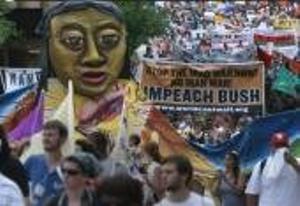|
|
Report on U.S. Social Forum
un article par Bruce K. Gagnon
(reprinted by permission from Gagnon's blog at http://space4peace.blogspot.com which was posted on July 5)
This trip report covers the period of June 27 - July 2 as Mary Beth Sullivan and I traveled to Atlanta, Georgia to attend the U.S. Social Forum
Mary Beth and I were encouraged to attend the first-ever U.S. Social Forum (USSF) by WILPF and Global Network member Carol Urner from Oregon. Carol invited Mary Beth and I to speak at two workshops she organized - one called War in Space or Life on Earth and the other called A War Economy or an Economy for Peace?...

When we arrived in Atlanta on June 27 we were picked up at the airport by old friends who are with the Buddhist order Nipponzan Myohoji and who built a temple in the city nine years ago. Rev. Utsumi and Sr. Denise Laffin took us downtown for the beginning of the march through the city that was to kick off the USSF. The march had at least 5,000 people in it (although the next day the newspaper reported only 1,000 were present) and was an inspiring mix of Native Americans, Black, Hispanic, disabled and a high percentage of young people. The nearly two-hour march went by the Grady Memorial Hospital where we were met by a large delegation of hospital workers chanting "Don't close Grady". Our friends told us the hospital serves the poor and uninsured in Atlanta and is facing closure because of financial problems. This was all the more real for us as we had just seen Michael Moore's new move Sicko which is all about the ailing health care system in the U.S.
More than 10,000 people attended the USSF and each day three workshop sessions were held at various venues around the downtown area. Each workshop slot had about 100 choices so it was difficult to decide from among so many interesting topics.
[article continued on discussion page).
|








|
DISCUSSION
Question(s) liée(s) à cet article:
The U.S. Social Forum 2007, Can you add to this evaluation?
* * * * *
Commentaire le plus récent:
[USSF analysis by Judy Rebick. Continued from above]
Almost every one of the 900 workshops over four days was filled to the brim with activists who were sharing strategies in everything from food security to community/labour alliances to a new taking back our cities movement against gentrification. The plenary speakers were majority women, people of colour, and young people. There was not a single left-wing star among them. In a culture obsessed with celebrity, the organizing committee decided they didn’t need any, even the good ones.
None of the big NGOs in the United States were on the planning committee. The idea that foundation-funded, majority white, centrist and Washington dominated NGOs and think tanks have hijacked the left was present throughout the forum. These groups were welcome to participate, but not in a leadership capacity.
Another extraordinary feature of the forum was the role of indigenous people who led the opening march and participated on several panels as well as had their own plenary.
Much of the vision came from them. After talking about the melting of the glaciers, Faith Gemmill from the REDOIL (Resisting Environmental Destruction on Indigenous Land) in Alaska said, “Our people have a prophesy that there will come a time in the history of humanity when people are in danger of destroying ourselves. . ... continuation.

|
|









